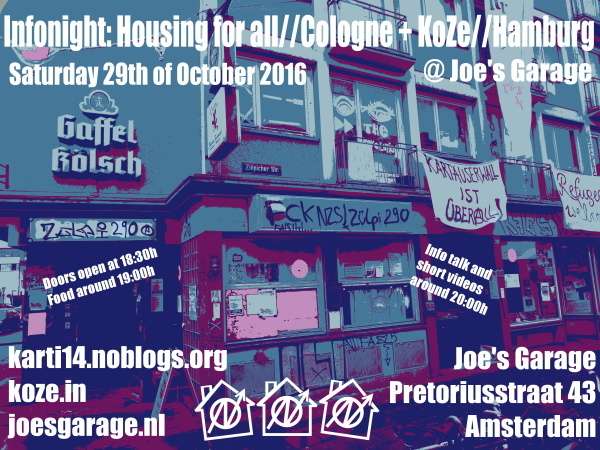At the end of October, two collectives from Cologne and Hamburg will be in Amsterdam in order to exchange ideas and experiences about the local struggles for housing and the establishment of solidary structures in our cities and beyond its limits.
Koze is the ‘Collective Center/Kollektives Zentrum’ in Hamburg, that was founded through a squatting action in 2014 and is currently under thread of eviction.
‘Housing for All’ / ‘Wohnraum für Alle’ is active since 2013. Since September 2015, the collective transformed into a small movement putting a row of focused actions in place to inform the public about particular cases of displacement and to directly re-appropriate empty/emptied housing properties for their very social meaning, being a place to live, accessible for all.
Three houses have been squatted since October 2015; a ‘Housing Speculator Tour’ was conducted; a ‘Wicked Rent Party’ was hold during the visit of an overpriced apartment; a street theater was performed in front of one of the squatted but then evicted and demolished houses; the same construction side was occupied for one day….
In contrast to previous squatting actions in Cologne, the most recent occupation of ‘Zülpi 290’ turned out to last for seven month and resulted in its legalization in July 2016. The two squatted houses are rented now by the city of Cologne for the next 30 years and are going to be renovated by the owner. After the renovation, the larger one of the two houses is used by the city to provide social rent apartments for refugees while the smaller one will become a self-organized housing project, run by people from the former squat.
As the housing situation in the city is out of control anyways, there is room for putting squatting back on the table
Usually, squatting actions in Germany do only last for a few days, it not a few hours at all. Private property is highly protected by law, thus owners can easily demand an eviction by the police. Several cities apply special police laws that give the police the power to evict squatted houses without the consultation of the owner.
Taking back space for living or resisting to leave will almost always be repressed in the first place. But this is also not always the case, as we will see during the evening. Often a good political strategy proofs to be helpful. Since quite some years there exists also a broad and diverse movement regarding a general “Right to the city” in many larger and smaller cities.
In Cologne, the last larger period of the city’s squatting movement ended in the begin of the 90ties, while many of the following actions where often isolated projects and rarely embedded in a larger or constant campaign. Especially squatting for living is very rare. There are more attempts to squat for social or autonomous centers or more recently, to prevent forced evictions of tenants. In Cologne, the campaign for an autonomous social center, that already started around 2006 with the ‘Pingotopia’ squat, was finally successful in 2010, also with a big squatting action.
Having this in mind, it was a little “surprise” that two of our squatting actions lasted for one month at ‘Kati14’and seven month at ‘Zülpi290’ respectively.
The relatively long period of squatting opened up many new perspectives, not always those that we like
When squatting ‘Zülpi290’, we realized that the daily life in organizing a political squatting action is as important as the overall objectives of the action (some of those that we mentioned above). This daily life was the one factor where we constantly reached or outrun our personal and collective limits, while approaching the overall objectives was quite isolated from it and seemed more easily achievable. At the same time, the daily life is not mentioned at all in our own outside representation.
During the evening we will dig a bit deeper into that. Two of those many related aspects is the social interaction among us and a trait special for the german situation: the existence of the initial group that squatted and occupied the building in the beginning in order to work out their political strategy, but that would not live there permanently as they already have a place they need to keep due to the immanent thread of an eviction, while, on the other hand, different people will join the squatting action afterwards and intend to live there.
This causes a lot of frictions. Those frictions severely feed back into many of our relationships and we learned the hard way, that the social individualization and diffusion of companionship caused by the ever-present neo-liberal way of life/system shaped and diminished our abilities for gracious social interaction to a larger or lesser extend.
So we failed often and had many chances to learn…
Condensed perception
As the city is the place of condensed dissimilarities of its inhabitants, we could consider our actual squatted houses and it surroundings as places where the thematic diversity of political and social movements do converge, where we can relate and incorporate many singular issues to our practices, in those very places we squatted.
We could also see the possibilities beyond our own focus on housing. That is strengthening of existing and the establishment of new solidarity and self-organized structures among us, the neighborhood, our city, to overcome the system of exploitation, control and authority we live in ( on a sunny day, of course).

